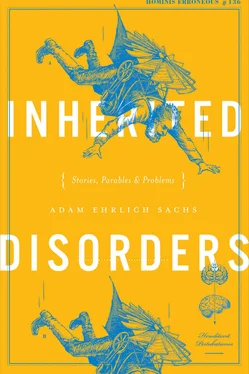…………………….
An eminent anthropologist at our university rose to fame in the 1960s with a monograph on the hitherto unknown South American tribe of Y., with whom he had lived for nearly seven years. He described the tribe as violent and irrational, inclined by nature to maim and murder at the slightest provocation.
Thirty years later, his son — who inevitably became an anthropologist himself — visited Y. (against his father’s wishes) and produced a revisionist account, depicting the tribe as supremely peaceful and reasonable.
The son now rose to fame, while the father fell rapidly into disregard.
A long and painful estrangement ensued.
At last, at the son’s urging, they returned to Y. together to resolve the dispute. The instant they stepped off their boat they were attacked by the people of Y., who hacked off the father’s head and left the son paralyzed from the neck down.
The quadriplegic son, now kept alive by modern science, recently announced that he would be writing another book, a book that would synthesize his father’s findings and his own. His father had overstated the tribe’s violence and irrationality, while he himself may have exaggerated their placidity and rationality. Now, by operating the computer on his wheelchair with his tongue, he plans to write an account that strikes a middle ground, halfway between their two positions.
…………………….
The Brentano Brothers, who aside from the Brothers Grimm were the most prolific of the nineteenth-century anthologizers of peasant folklore, have been accused in recent decades of not only sanitizing these tales, taming their brutality, but also of transforming every father, in the final paragraph of every tale, into a root vegetable — a potato, carrot, turnip, or beet — full still of moral certainties, from whom the son “had never felt more distant,” and whom the mother eyes for a planned soup. These root vegetable transformations were not present in the original tales , according to folklore researchers who recently discovered in Palermo a trove of material that the brothers drew upon as a source, thus resolving some enduring mysteries of their work (why, for example, so many father characters are introduced in the second-to-last paragraph, only to be turned almost immediately into root vegetables, and then into soups, soups full still of moral certainties). These researchers have announced plans to publish a new edition of the Brentano Brothers tales with the violence and cruelty of the original material reinstated, and the father-to-root-vegetable transformations eliminated altogether.
…………………….
An embittered screenwriter hammered into his son from a young age the simple, sad fact that Hollywood is run by businessmen, not artists. His whole career he’d been subject to the whims of the most ignorant, the most shortsighted, the most mercenary, and the most superficial men and women, products for the most part of Harvard Business School, who with their crude, knee-jerk judgments had refused again and again to produce the one script he had ever written that had any actual artistic merit, his project about the Bosnian War.
Don’t follow my path, he told his son. If you want to make movies, make money .
The son did not need to be told twice. The indignities his father had suffered over the Bosnia script — a work of undeniable genius — had left a profound impression on him. The son studied finance, not literature, went to Harvard Business School, not film school, and took a job at a private equity firm. All along, he nurtured a secret fantasy: years from now, having taken over a movie studio, he would burst into a hospital room and whisper into his dying father’s ear, “Dad, we’re doing the Bosnia project.”
Slowly but surely, as they say, that dream came true. He made a ton of money in New York and converted it effortlessly into Los Angeles power.
Fifteen years later he stood in his opulent office at Paramount, his father’s Bosnia script in hand. Sadly, the script, which he had read probably ninety-nine times in childhood, awed every time by its genius, now, on the hundredth read, the first not to take place under his father’s roof, was revealed to be complete garbage. Only when we have money and power of our own, thought the son as he drove to the hospital where his father lay dying, can we read our father’s work honestly and see it for what it is, garbage not genius. That is the sad fact. Under his roof our father’s work looks like genius, but under our roof, or our company’s roof, it is revealed to be garbage. People like my father think money and power distort everything, he thought en route to the hospital, but really they make everything clear.
100: THE FLYING CONTRAPTION
…………………….
A nineteenth-century Italian aristocrat who died trying to pilot his homemade flying contraption off a cliff in southern Tuscany, near Grosseto, instructed his wife with his final breaths to repair and to hang the contraption from a hook in their newborn son’s nursery, in order to remind the boy of his father and his father’s long struggle against the force of gravity, but not to allow him, under any circumstances, to actually fly the contraption.
She did as he wished. She hammered a hook into the ceiling of the boy’s nursery and hung from it her beloved husband’s flying contraption, which consisted of two bicycle pedals and a bicycle seat connected to a pinwheel of considerable size. And each morning when she plucked the boy from his crib, they had a little look at it. And she told him how clever his father had been, to attach the pedals and the seat to the pinwheel, and how brave, and how determined. What she respected most of all, she always told the boy, was that his father had been born rich and could have chosen a life of leisure, but instead he chose to struggle, and he chose to struggle against one of the greatest foes of all.
“Gravity,” said the boy, when he was older.
“Yes, indeed, gravity,” said his mother.
“But I must never fly it myself, right?” said the boy. “Because it isn’t safe?”
“That’s right,” said his mother. “You must never fly the contraption yourself.”
This made the boy sad. It made him sad, at first, because he wanted to be brave like his father! But later, when he had learned a little bit about aeronautics, it made him sad to think that his mother thought he would even be tempted to try to “fly” that thing. Two bicycle pedals attached to a bicycle seat attached to a pinwheel . Was his father, he often wondered as he stared at the contraption dangling on its hook, a stupid man, or an insane person, or both? Was his mother, who had never doubted his father’s “struggle against the force of gravity,” stupid, insane, or both? Had he inherited their stupidity? Their insanity? How much of his fortune had been squandered obtaining the pinwheel and connecting it to the pedals?
“You must never, ever try to fly the contraption yourself,” his mother told him every single day, without fail.
“Got it, no flying the contraption,” he replied. He wondered whether there was anything going on inside his mother’s brain, or if she was more like an animal. “Contraption is a no.”
As the years passed he came to resent the flying contraption more and more, this ridiculous and unsolicited intrusion of his father’s — either stupid or insane — life into his own. He had nightmares of his stupid — or probably insane — father pedaling and falling, pedaling and falling, glancing up periodically with concern at the pinwheel. Meanwhile, his relationship with his mother suffered, grew false, based as it was on the foundational lie that his father’s contraption was aeronautically compelling. He resented his father for building it, and he resented his mother for hanging it on a hook in his room. He resented his late father’s absurd conviction in his flying contraption, and he resented his mother’s equally absurd conviction in his father. He resented them, but he also felt sorry for them. He felt sorry for himself, too: for his modern condition. (By now he had read Nietzsche.) He would have loved to believe in anything as much as his stupid mother believed in his insane father, or as his insane father believed in his homemade flying contraption.
Читать дальше












